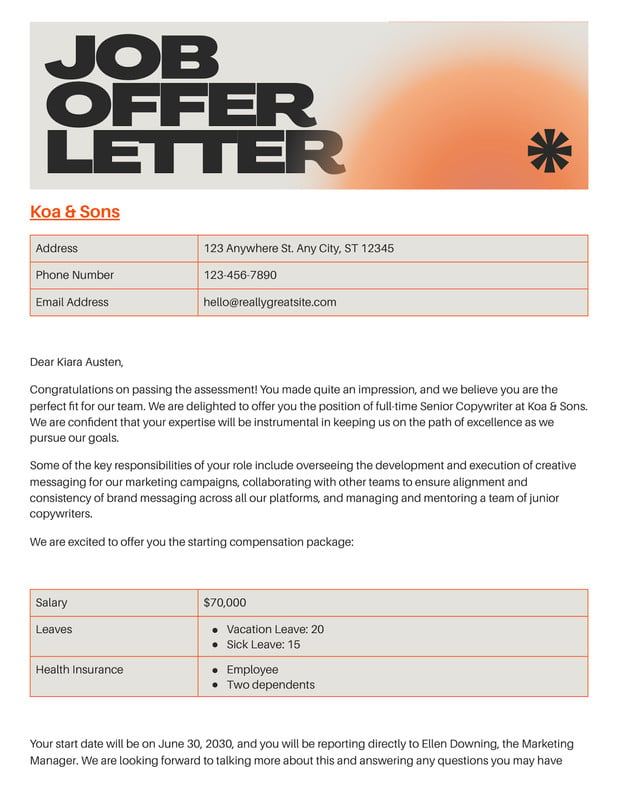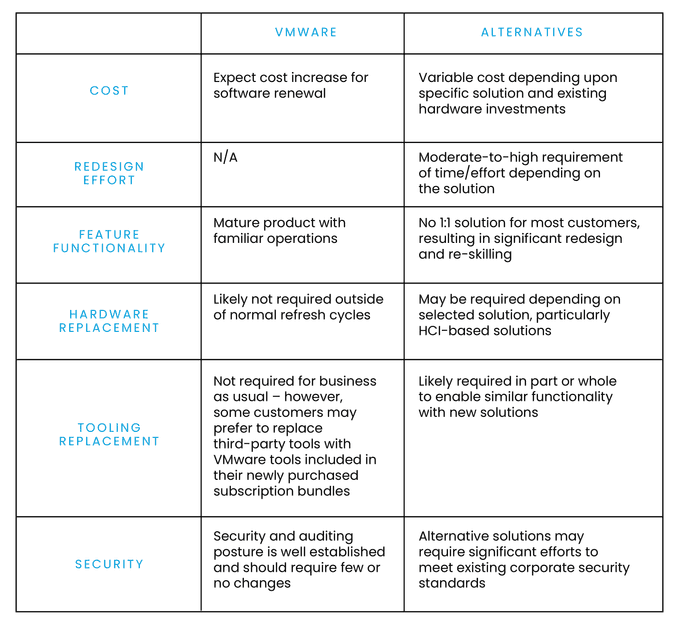Responding To A 'Best And Final' Job Offer: A Practical Guide

Table of Contents
Understanding the Implications of a "Best and Final" Offer
A "best and final" offer from an employer signals a significant point in the hiring process. Understanding the employer's perspective is vital. Why do they use this tactic? Often, it's an attempt to conclude negotiations and avoid protracted discussions. They may have budgetary constraints, internal deadlines, or simply want to move forward with the hiring process.
- Signals the end of formal negotiations: This implies limited further flexibility. Prepare yourself for the possibility of the offer being truly final.
- Implies limited flexibility on their part: This doesn't always mean no flexibility, but it's a strong indication that significant concessions are unlikely.
- May be a genuine final offer or a negotiating tactic: It's impossible to know for certain their intentions without thorough evaluation. However, understanding that the offer could genuinely be their limit helps avoid unrealistic expectations.
Rejecting a "best and final" offer carries risks. It could mean losing the opportunity altogether. Consider the value of the overall package and whether the potential risks of rejection outweigh the potential gains of further negotiation.
Assessing the "Best and Final" Job Offer
Before responding, meticulously analyze the entire compensation package. Don't just focus on the salary. Consider:
- Salary: Is it competitive with industry standards for your role and experience level? Use online salary calculators and resources to benchmark.
- Benefits: Carefully review health insurance options, retirement plan contributions (401k matching, pension), paid time off (vacation, sick leave, holidays), and any other perks offered.
- Bonuses: Are there any performance-based bonuses or signing bonuses included? Understand the criteria for achieving these bonuses.
- Other perks: Consider stock options, professional development opportunities, and any other benefits the company provides.
Compare your findings to your initial salary expectations and market research.
- Review salary against industry benchmarks: Use reputable sites like Glassdoor, Salary.com, or Payscale to see what similar roles in your area typically pay.
- Evaluate benefits package: Consider the total cost of benefits to you and compare it to other offers you might have received.
- Consider long-term career growth potential: Does this company offer opportunities for advancement and skill development? This is a crucial non-monetary factor.
Beyond financial aspects, consider the company culture, work-life balance, and opportunities for professional growth. These factors significantly impact overall job satisfaction.
Strategically Responding to a "Best and Final" Offer
A counter-offer should only be considered if you have strong justification and leverage. Don't counter impulsively; carefully weigh the potential outcomes.
- Only counter if you have strong justification and leverage: This might include multiple competing job offers, unique skills highly valued by the employer, or a demonstrably low initial offer compared to market value.
- Focus on specific aspects of the offer, not a general increase: Don't simply ask for a higher salary; pinpoint specific elements (e.g., inadequate benefits, lower bonus than industry standard) and justify your request.
- Be polite, professional, and concise in your counter-offer: Maintain a respectful tone throughout the negotiation process.
When preparing your counter-offer, be specific and data-driven. Back up your requests with factual information about industry standards and your unique skills and experience.
If you decide against a counter-offer, a graceful rejection is essential. Express your appreciation for the opportunity and clearly explain your reasoning professionally, without burning bridges.
Negotiating Effectively (if countering)
If you choose to counter, highlight your value proposition. Emphasize your skills, experience, and how you can significantly contribute to the company's success. Support your requests with data—market research, competitor analysis, or your past achievements. Frame your requests to demonstrate mutual benefit, highlighting how meeting your needs will also benefit the company. Maintaining professionalism and respect is crucial even when negotiating difficult terms.
- Prepare talking points beforehand: Practice your approach and anticipate potential counterarguments.
- Be prepared to compromise: Negotiation is a two-way street. Be flexible and willing to find a mutually agreeable solution.
- Set a deadline for your response: This provides structure and encourages prompt decision-making.
Accepting or Rejecting the Offer
Once you've made your decision, communicate promptly and professionally. Send a formal acceptance or rejection email, clearly stating your choice. Regardless of your decision, express appreciation for the offer and the time invested by the employer. In your acceptance letter, confirm all key terms and conditions. Maintain a positive relationship, even if you decline the offer; you never know when your paths might cross again.
- Express appreciation for the offer (regardless of your decision): Professional courtesy is essential.
- Confirm key terms and conditions in writing: This ensures clarity and avoids future misunderstandings.
- Maintain a positive relationship, even in rejection: Networking is crucial for career advancement.
After accepting, follow the employer's instructions regarding onboarding and next steps. If rejecting, consider networking with the hiring manager for future opportunities.
Conclusion
Responding to a "best and final" job offer necessitates careful assessment, strategic thinking, and professional communication. By thoroughly analyzing the offer, understanding your leverage, and communicating effectively, you can significantly improve your chances of achieving a positive outcome. Remember to approach a best and final offer with a strategic plan and avoid impulsive reactions.
Call to Action: Mastering the art of responding to a "best and final" job offer is crucial for career advancement. Learn more about effective job offer negotiation strategies and secure your best career opportunities. Don't let a "best and final" offer catch you off guard; prepare yourself for success in employment negotiations.

Featured Posts
-
 Kapitaalmarktrentes Stijgen Verder Impact Op De Euro En De Markt
May 24, 2025
Kapitaalmarktrentes Stijgen Verder Impact Op De Euro En De Markt
May 24, 2025 -
 Gen Zs Marketing Maven How Alix Earles Dancing With The Stars Appearance Amplified Her Brand
May 24, 2025
Gen Zs Marketing Maven How Alix Earles Dancing With The Stars Appearance Amplified Her Brand
May 24, 2025 -
 Stock Market In Amsterdam Down 2 Post Trump Tariff Announcement
May 24, 2025
Stock Market In Amsterdam Down 2 Post Trump Tariff Announcement
May 24, 2025 -
 How To Get Bbc Radio 1s Big Weekend 2025 Sefton Park Tickets
May 24, 2025
How To Get Bbc Radio 1s Big Weekend 2025 Sefton Park Tickets
May 24, 2025 -
 Broadcoms V Mware Acquisition At And T Reports A Staggering 1 050 Price Increase
May 24, 2025
Broadcoms V Mware Acquisition At And T Reports A Staggering 1 050 Price Increase
May 24, 2025
Latest Posts
-
 Astrologia Semanal Horoscopo Del 1 Al 7 De Abril De 2025
May 24, 2025
Astrologia Semanal Horoscopo Del 1 Al 7 De Abril De 2025
May 24, 2025 -
 Predicciones Astrologicas Horoscopo Semanal 1 7 Abril 2025 Para Todos Los Signos
May 24, 2025
Predicciones Astrologicas Horoscopo Semanal 1 7 Abril 2025 Para Todos Los Signos
May 24, 2025 -
 Horoscopo De La Semana Del 1 Al 7 De Abril De 2025 Tu Guia Astrologica Completa
May 24, 2025
Horoscopo De La Semana Del 1 Al 7 De Abril De 2025 Tu Guia Astrologica Completa
May 24, 2025 -
 Horoscopo Semanal 1 Al 7 De Abril De 2025 Predicciones Para Todos Los Signos
May 24, 2025
Horoscopo Semanal 1 Al 7 De Abril De 2025 Predicciones Para Todos Los Signos
May 24, 2025 -
 Hangi Erkek Burclari Babaligi Zorlastiriyor Gueven Sadakat Ve Calkanti
May 24, 2025
Hangi Erkek Burclari Babaligi Zorlastiriyor Gueven Sadakat Ve Calkanti
May 24, 2025
